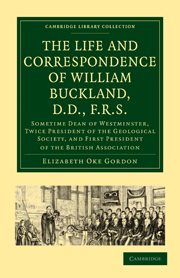 The Life and Correspondence of William Buckland, D.D., F.R.S.
The Life and Correspondence of William Buckland, D.D., F.R.S. CHAPTER V
Published online by Cambridge University Press: 05 November 2011
Summary
The year 1831 brought to light the first germ of the British Association. Mr. (afterwards Sir David) Brewster proposed that a “craft should be built wherein the united crew of British science could sail.” His notion found an enthusiastic supporter in the Rev. W. Vernon Harcourt, a great lover of science, who invited all Philosophical Societies in Great Britain to meet at York. Buckland, who was unable to be present, owing to the death of a child, writes to express his “bitter disappointment” at his enforced absence. He was chosen President of the next meeting, which was held the following year at Oxford.
An old geological pupil of his, the Rev. W. Egerton, the present Rector of Whitchurch, Salop, has kindly placed at the service of the biographer Buckland's humorous letter of congratulation to his brother, Sir Philip Egerton, upon his intended marriage, and visit to Oxford for the meeting of the Association.
“Christ Church,
“January 23rd, 1832.
“My dear Sir Philip,—Mrs. Buckland begs to unite with me in the offering of our most sincere congratulations to you on the brilliant Discovery announced in your last, of a Jewel of great price which you have resolved to make your own, and to submit to the inspection of the learned, at our proposed scientific meeting in June next.
- Type
- Chapter
- Information
- The Life and Correspondence of William Buckland, D.D., F.R.S.Sometime Dean of Westminster, Twice President of the Geological Society, and First President of the British Association, pp. 120 - 149Publisher: Cambridge University PressPrint publication year: 2010First published in: 1894


